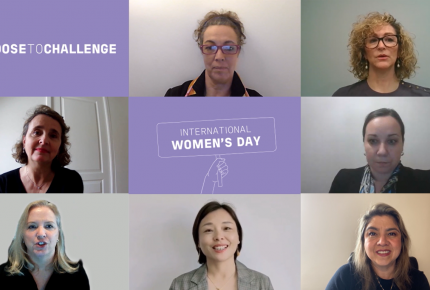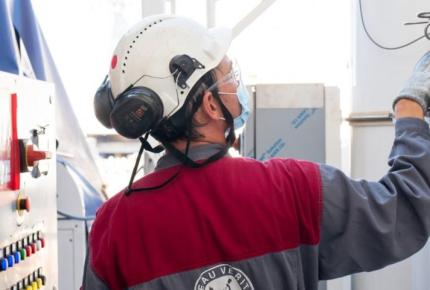WOMEN IN LEADERSHIP:
Elisabeth Iride
The Women In Leadership series by Bureau Veritas Certification compiles a variety of interviews from our female managers, providing a platform to speak on the challenges and opportunities they have faced throughout their careers. Join us each month to hear the stories of some of our many #WomenInLeadership.
Over her twenty-year career in learning and development, Elisabeth Iride has worked across training strategy and design, sales, and client relations at companies in the UK and France. Today, harnessing her valuable expertise, she leads the transformation of Bureau Veritas’ training offer as Global Training Manager. She discusses her approach to leadership, as well as her views on ongoing gender inequality in the workplace.
Global Training Manager
Bureau Veritas
Never give up in the face of adversity.
What motivated you to begin a career in training and development?
After training as an IT developer, I swiftly realized that coding wasn’t for me. A natural pivot into IT training prompted a return to education, where I qualified in Instructional Design and Competency Management. My career evolved from there!
What I love about training is the positive impact it has on others. Training can enable people to overcome hurdles, gain new skills, or simply grow in confidence. When someone tells me that training has helped them achieve a goal, I consider that a success.
In your day-to-day role, what are you typically doing?
I split my time between analyzing global market trends and developing new training courses and solutions in order to create a new learning experience for our clients. A current focus is about building new blended training paths which include virtual classes, e-learning modules and/or face-to-face courses. We are planning to roll these out globally over the next five years.
My role involves working with different teams and divisions across the globe. One day I could be interacting with the Shared Service Center in India. The next, working on a project with training managers across the organization. In this position, I am an influencer rather than a direct manager, but the approach I take to leadership is the same.
What qualities do you believe are important in leadership?
Have clear vison and goals, and share them with people. Explaining the aim of a project helps offer not just clarity, but gives people perspective and goals to reach. Providing meaning is hugely important – it also shows you care about your team. Caring about people will foster their development: it’s a fundamental foundation of leadership.
I consider empathy as another key leadership pillar. It helps bolster people’s confidence. Be a good listener, encourage and empower your team members, and recognize success. We’re very good at communicating when something hasn’t been done to a certain standard, but we don’t practice positive recognition enough.
So yes, be authentic. But remember to be analytical too. Leaders make decisions that impact the team, and even the organization. By stepping back and analyzing risks, you ensure that you are making the most informed decision you can.
What challenges have you overcome during your career?
Earlier in my career, I was disrespected simply because I was a woman – my competencies weren’t recognized. I had to work harder than men to get to the same level despite being just as qualified. What was surprising to me was that I didn’t face discrimination in companies in which you might expect it. I worked for a construction company and had a very positive experience.
Over the last 10 years, we've seen a lot of positive discrimination initiatives, and this will continue into 2022. But we must examine why these programs are still required. To me, it indicates that gender equality is still a long way off.
What advice would you offer to young women entering the workplace today?
Learn communications skills and coaching techniques: active listening, effective questioning, navigating relationship dynamics. Relationships are the basis of everything, and building strong ones makes your work life efficient and enjoyable.
Self-analysis plays a big role in relationship building. I am an advocate of the reflexive approach. It enables you to step back and reflect on your action to identify what worked, or what didn’t. It assists you in avoiding ineffective actions as well as stress escalation. If you can manage your own behaviors and emotions, you’ll work better with others.
Also, be curious, creative, and learn about yourself! Push yourself to develop new skills and explore different career paths – you could surprise yourself. Finally, refuse to be disrespected, or it will damage your own integrity and self-perception.
Thank you to Elisabeth Iride for taking the time to answer our questions. For more of our #WomenInLeadership series, keep an eye on our website. We have more great interviews coming soon.


